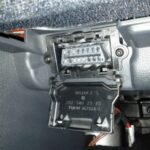While a Bluetooth OBD2 adapter can provide a wealth of information about your car’s performance, it’s crucial to understand its limitations when it comes to tuning. A standard Bluetooth OBD2 adapter, paired with a smartphone app, allows you to read diagnostic trouble codes (DTCs), monitor real-time data like engine RPM, speed, and coolant temperature, and even reset the check engine light. However, it cannot directly tune your car’s engine parameters.
Why Can’t You Tune with a Basic Bluetooth OBD2 Adapter?
Tuning involves modifying the engine control unit (ECU)’s parameters to alter performance characteristics like horsepower, fuel efficiency, and throttle response. This requires specialized software and hardware that can directly communicate with and reprogram the ECU. A standard Bluetooth OBD2 adapter and generic app simply lack this capability. They are designed for reading data, not writing or modifying it. Think of it like reading a book – you can gather information, but you can’t change the words on the page.
What Do You Need for Car Tuning?
Actual car tuning requires specific tools and expertise:
- Tuning Software: Professional-grade software designed for your specific car make and model is essential. This software allows tuners to access and modify the ECU’s maps and parameters.
- Tuning Hardware: An interface that connects your computer to the car’s OBD2 port is needed. This interface is more sophisticated than a basic Bluetooth adapter, enabling two-way communication with the ECU for data reading and writing. Examples include devices from Kess V2, MPPS, or AutoTuner.
- Expertise: Tuning requires a deep understanding of engine management systems, fuel maps, ignition timing, and other complex parameters. Incorrect tuning can significantly damage your engine. Professional tuners possess the knowledge and experience to optimize performance safely and effectively.
Advanced OBD2 Devices: A Gray Area
While standard Bluetooth OBD2 adapters can’t tune, some more advanced OBD2 devices marketed for performance enhancements exist. These often promise features like throttle response improvement or fuel efficiency gains. However, these devices typically don’t offer true ECU remapping like professional tuning software. Instead, they might manipulate sensor readings or send pre-programmed adjustments to the ECU within a limited range.
The Brockway 900/900e: An Example of Monitoring, Not Tuning
The Brockway 900/900e, for example, is a device that connects to the OBD2 port and displays real-time data like RPM, speed, and various sensor readings. While it offers features like a shift light and 0-60 timer, it doesn’t modify the ECU’s programming. It provides valuable information for monitoring performance, but it doesn’t offer tuning capabilities. As described on the Brockway Engineering website, the device accurately displays data received from the ECU but does not alter it.
Conclusion: Bluetooth OBD2 for Diagnostics, Not Tuning
A Bluetooth OBD2 adapter is a valuable tool for diagnosing car problems, monitoring performance data, and understanding how your engine operates. However, it’s not designed for tuning. If you’re looking to enhance your car’s performance through tuning, consult with a qualified professional and invest in the appropriate software and hardware. Using the wrong tools or lacking the necessary expertise can lead to costly engine damage.

